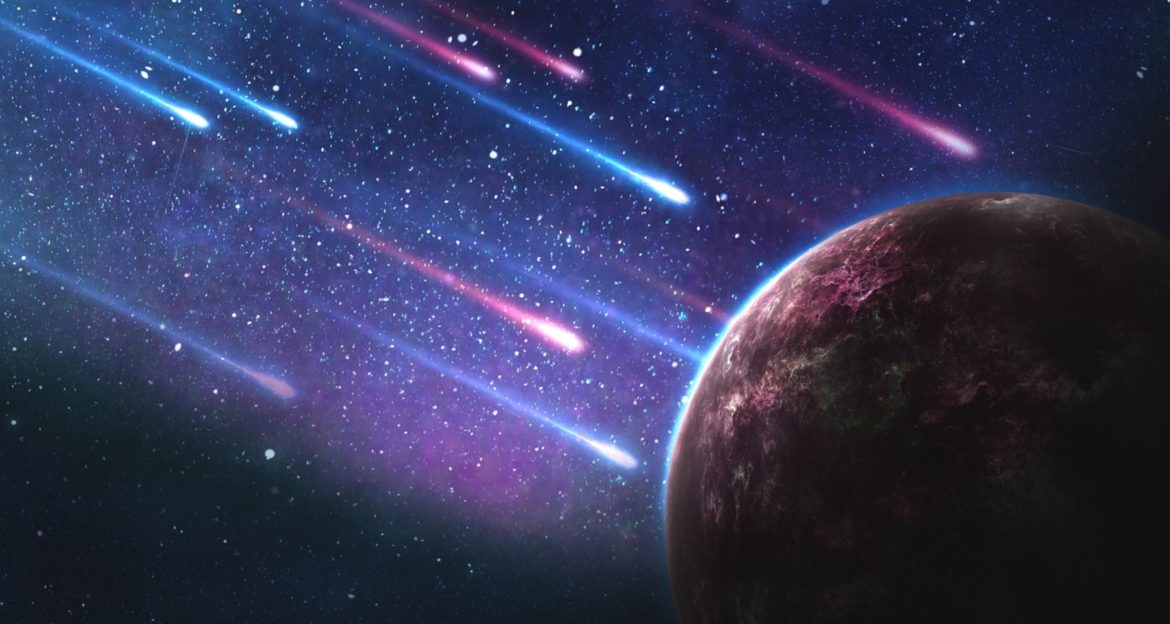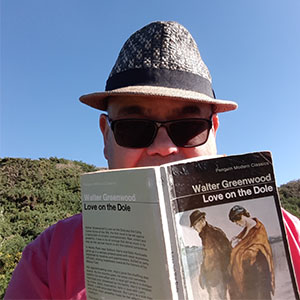
Below you’ll find the musings, hypotheses and predictions from some of the shadow jury on the winner for this year’s Arthur C. Clarke Award.
The winner will be announced at a public award ceremony held in partnership with Foyles Bookshop, Charing Cross Road, on Wednesday 18th July 2018.
Nick Hubble
 It’s actually quite difficult to reflect on the shortlist while also trying to predict the winner. The question of the latter rather overshadows a wider consideration of the former for the moment. In my opinion, two of the novels are well ahead of the others and I would expect it to be one of those which wins. In this respect, the situation is not so different to last year when the shadow jury (and I suspect the actual jury) considered it to be a competition between Colson Whitehead’s The Underground Railroad and Lavie Tidhar’s Central Station. However – somewhat out of step with most of my fellow Sharkes – I also thought Tricia Sullivan’s Occupy Me was a really good novel. The Sharkes as a whole (but not me) predicted incorrectly that Yoon Ha Lee’s Ninefox Gambit would be the actual winner. That wouldn’t have been a bad result either. I think the right book won and on reflection the short list was good and probably a varied and pleasant experience on the whole for anyone reading through it before the Award (I enjoyed reading Emma Newman’s After Atlas and Becky Chambers’s A Closed and Common Orbit as well). I think the same could be true of this year’s list although from some of the reactions I have seen there are probably more ‘marmite’ reads on it. In particular, American War and Gather the Daughters are very full-on, uncompromising, powerful narratives that some readers are inevitably going to bounce off.
It’s actually quite difficult to reflect on the shortlist while also trying to predict the winner. The question of the latter rather overshadows a wider consideration of the former for the moment. In my opinion, two of the novels are well ahead of the others and I would expect it to be one of those which wins. In this respect, the situation is not so different to last year when the shadow jury (and I suspect the actual jury) considered it to be a competition between Colson Whitehead’s The Underground Railroad and Lavie Tidhar’s Central Station. However – somewhat out of step with most of my fellow Sharkes – I also thought Tricia Sullivan’s Occupy Me was a really good novel. The Sharkes as a whole (but not me) predicted incorrectly that Yoon Ha Lee’s Ninefox Gambit would be the actual winner. That wouldn’t have been a bad result either. I think the right book won and on reflection the short list was good and probably a varied and pleasant experience on the whole for anyone reading through it before the Award (I enjoyed reading Emma Newman’s After Atlas and Becky Chambers’s A Closed and Common Orbit as well). I think the same could be true of this year’s list although from some of the reactions I have seen there are probably more ‘marmite’ reads on it. In particular, American War and Gather the Daughters are very full-on, uncompromising, powerful narratives that some readers are inevitably going to bounce off.
Nevertheless, my sense is that this year’s shortlist is not really different in kind to 2017’s and those of the decade in general. Looking back at the shortlists from the first decade of the new millennium, it looks fairly clear what SF is and one of the questions was whether literary writers of fantastika, such as China Miéville, were doing it better than speculative literary writers, such as David Mitchell. By 2010, when Miéville won for the third time, the question seemed to have been settled. Since then, however, the focus seems to have shifted from the literary end of the spectrum to a more fundamental concern with genre and the values that shape it. In part this is a direct consequence of the impact of writers such as Ann Leckie, N.K. Jemisin and Kameron Hurley reshaping and revolutionizing core genre. Yet 2014 aside, the influence of this epochal shift has mostly been felt in the Hugos. In the Clarke, these shifts seem to have unsettled the shortlist selection process by eliminating value criteria that might once have held. On the one hand, it is great that a good novel about talking spiders, which almost certainly wouldn’t have been shortlisted a decade earlier, won in 2016. On the other hand, there have been several frankly bizarre inclusions on the shortlist in recent years. Among this category is this year’s Sea of Rust, entertaining though many might find it (and it is certainly not the worse book to be shortlisted this decade). I can only conclude there is a problem with how the term ‘science fiction’ currently operates. It currently functions so elastically as to include anything from the genre spectrum – and seems to need to be seen to be including works from across that spectrum – while still remaining curiously inflexible in the face of certain works marked as fantasy. Hence, the otherwise inexplicable exclusion of Jemisin over the last two years.
The consequence of these shifts in the genre has been to create uncertainty and confusion about Clarke shortlists. I certainly can’t predict what will be shortlisted (whereas ten years ago, you could always be pretty certain of half of the list). For example, Allan, Harkaway and Robinson would all have been reasonable shouts but none of them are on the list. As a result, you can’t generalise about the field in 2018 from this list. Obviously, that is not the direct purpose of the Award but it used to be a feature of the wider critical discussion surrounding it. After two years on the shadow jury, I am no longer convinced there is any point in trying to use the Award to underpin such discussions. At the very least, it is only one of a number of other processes that need to be considered. I may have more to say about this in a subsequent post.
Turning back to the matter in hand, any of the shortlist other than Sea of Rust might conceivably win. I think the issues raised in our panel discussions concerning the unsatisfactoriness of aspects of the future extrapolation in both American War and Dreams Before the Start of Time should rule them out. I like Gather the Daughters more than some critics because I read it as a very dark fable rather than a realist text subject to some of the issues of plausibility that arise. The strongest two novels, however, are Spaceman of Bohemia and Borne. I hope one of these wins and I expect it to be one of these (unless American War somehow powers through in the single-minded manner in which it is written). Spaceman is charming, philosophically compelling and (as a European sickened by the current fawning of the UK Government over the vile and despotic Trump) I loved the European focus and history. I will read it again (and again in all probability). However, Borne edges it for me. It is a mature work of SF, which reworks class SF themes but produces a fresh, compelling and engaging discussion of personhood that speaks to the overwhelming context of our time: the need to survive the twenty-first century. I predict it will be the winner next week.
Foz Meadows
 Of the half of the shortlist I was able to read – Sea of Rust, Dreams Before the Start of Time and Borne – the latter was my overwhelming favourite. Not having read American War, Spaceman of Bohemia or Gather the Daughters, I can’t speak with first-hand intelligence about their contents; based on their blurbs and other reviews, however, my abiding suspicion is that none of them are likely to appeal to me more than Borne did. The premise of Gather the Daughters is one which I felt wholly unequipped to attempt at present: I’ve read and praised novels written along similar lines before – the obvious comparison would seem to be Atwood’s The Handmaid’s Tale – but generally speaking, that particular category of fiction is one I find more tense than relaxing, the conceit inherently claustrophobic no matter the skill of the execution. I feel a similar guilt about not attempting American War, particularly given its salience to current politics; but then, that’s the same reason why I didn’t feel up to it. I’m already at my emotional limit for real stories about children in concentration camps, and while that certainly doesn’t obviate the importance of exploring those themes in SFF, it’s not what my heart needs right now. By contrast, I had no such intimate objections to Spaceman of Bohemia: it just didn’t seem like my thing.
Of the half of the shortlist I was able to read – Sea of Rust, Dreams Before the Start of Time and Borne – the latter was my overwhelming favourite. Not having read American War, Spaceman of Bohemia or Gather the Daughters, I can’t speak with first-hand intelligence about their contents; based on their blurbs and other reviews, however, my abiding suspicion is that none of them are likely to appeal to me more than Borne did. The premise of Gather the Daughters is one which I felt wholly unequipped to attempt at present: I’ve read and praised novels written along similar lines before – the obvious comparison would seem to be Atwood’s The Handmaid’s Tale – but generally speaking, that particular category of fiction is one I find more tense than relaxing, the conceit inherently claustrophobic no matter the skill of the execution. I feel a similar guilt about not attempting American War, particularly given its salience to current politics; but then, that’s the same reason why I didn’t feel up to it. I’m already at my emotional limit for real stories about children in concentration camps, and while that certainly doesn’t obviate the importance of exploring those themes in SFF, it’s not what my heart needs right now. By contrast, I had no such intimate objections to Spaceman of Bohemia: it just didn’t seem like my thing.
Overall, this year’s shortlist stands out to me as one which, whether deliberately or by accident, has a unifying theme of (predominantly desolate) near futures. Sea of Rust posits a future without humanity, one populated by warring robots; American War shows a dystopian near future written in parallel to our political present. Spaceman of Bohemia seems more hopefully futuristic, in that it involves a trip to Venus, while what I read of Dreams Before the Start of Time shows a more intimate, domestic future, looking at the evolution of childrearing and families in ways which contrast starkly with the post-apocalyptic patriarchy of girls trained to be wives in Gather the Daughters. And then there’s Borne, with its bio-apocalypse of giant floating bears and monstrous squid-things, set against a landscape of traps and hopeful scavengers.
If nothing else, this shortlist speaks strongly to the cultural, historical moment in which we currently find ourselves and our various fears for the future. Where are we headed? What will become of us fifteen, fifty, a hundred years in the future? Will women and wombs become separate, autonomous entities, creating more and newer family structures, or will violent misogyny grind us back under its thumb? Will curiosity take us to the stars even as our humanity anchors us to Earth, or will we start yet more wars with one another as oil runs out and dangers proliferate? What sort of technological future are we envisaging – one where robots, metal and artificial intelligence are pitted against mortal flesh, or a bioengineered menagerie that blurs the line between born and made? Dreams Before the Start of Time versus Gather the Daughters; Spaceman of Bohemia versus American War; Sea of Rust versus Borne. No matter what anyone thinks of the individual merit or execution of these novels, you can’t deny there’s a neat thematic duality at play in the choices.
As to the eventual winner, I’ll venture two contenders: one from the books I’ve read, and one from those I haven’t. In the former category, Borne is the obvious choice; in the latter, I’ll place a bet on American War, based jointly on the thematic resonance between its themes and the present day and how I’ve seen it reviewed compared to Gather the Daughters and Spaceman of Bohemia. That being said, I think it’s important to note that, despite its intriguing thematic coherence, this year’s shortlist is ultimately comprised of books which – with the exception of Borne – fall outside my personal preferences. At the start of the Shadow Clarke, I said that my benchmark for what I’d consider a good book in this context had already been set by three titles on the longlist: Ann Leckie’s Provenance, N.K. Jemisin’s The Stone Sky and Yoon Ha Lee’s Raven Stratagem. Though other longlisted works have appealed to my tastes as established by that trio – most notably The Stars Are Legion by Kameron Hurley – I’m yet to read anything that comes close to landing as powerfully as Jemisin’s work. The Stone Sky is hardly hurting for award wins or nominations at this point, but there’s a damn good reason for that, and as such, I remain baffled at its exclusion from the shortlist, especially given the inclusion of something like Sea of Rust.
Which is, of course, just my opinion – but where else does judgement come from?
Gary Wolfe
 It probably should have occurred to me before now, but I have no idea who the most likely winner of the Clarke will be—not because I don’t have opinions about the finalists, but because I’ve never really paid enough attention to the process to try to handicap potential winners. This is true not only of the Clarke, but of the Hugo, Nebula, and most other awards. My best guess, I suppose, would be Borne, since it combines a number of the virtues of other novels in a wildly diverse list—vivid, almost hallucinatory imagery, provocative biomechanical ideas, a deep skepticism of corporate culture, elements of dystopia, a deep focus on character and identity. It’s probably also the most purely original of the novels. I can think of plenty of antecedents and analogues for the other finalists, but it’s really difficult to think of them for Borne (although there are of course a few echoes of VanderMeer’s own earlier work). So that’s my guess, and it’s very much a guess, I’m afraid.
It probably should have occurred to me before now, but I have no idea who the most likely winner of the Clarke will be—not because I don’t have opinions about the finalists, but because I’ve never really paid enough attention to the process to try to handicap potential winners. This is true not only of the Clarke, but of the Hugo, Nebula, and most other awards. My best guess, I suppose, would be Borne, since it combines a number of the virtues of other novels in a wildly diverse list—vivid, almost hallucinatory imagery, provocative biomechanical ideas, a deep skepticism of corporate culture, elements of dystopia, a deep focus on character and identity. It’s probably also the most purely original of the novels. I can think of plenty of antecedents and analogues for the other finalists, but it’s really difficult to think of them for Borne (although there are of course a few echoes of VanderMeer’s own earlier work). So that’s my guess, and it’s very much a guess, I’m afraid.
Alasdair Stuart

My favourite magic trick is the sealed envelope prediction. The moment at the start of the show when the Magician hands an audience member a signed, sealed and dated envelope and then works very hard making us forget about it for two hours before revealing they’ve predicted the entire show. The best one of these I ever saw was Darren Brown, who pulled off a sealed envelope so comprehensive and incredible that the 1812 overture played in your head as he ticked box after box. It’s an incredible vehicle for telling stories, a moment that yanks the audience member out of themselves as the magician drops the scales from your eyes and takes a bow, holding your watch in one hand.
This is a sealed envelope prediction. We have had no contact with the judges, no sense of what’s the favourite. It’s just us, and our heads, and the books. Here we go.
I think the race is between three books, maybe four. I don’t see Sea of Rust taking it because it’s so relentlessly commercial (Not that that’s a bad thing) and because Cargill is still finding his science fiction sea legs. I don’t see Dreams Before The Start of Time getting it because the brave, interesting choices Charnock makes with perspective open the novel up to criticisms that can’t be easily answered and that damages it when placed next to the others on the list.
I don’t think American War is going to take it. But it might. If it doesn’t it’ll be because it’s viewed as not being genre enough, in an oddly similar way to the Charnock. If it does, it’ll be because it will be viewed as transcending genre, ironically for the same reasons.
Which leaves us Spaceman of Bohemia, Borne and Gather the Daughters. All of which could win.
Borne is technically audacious, feverishly inventive and at no point did I emotionally engage with it being total admiration. It’s an incredibly well constructed book, and I’m excited to read the other stories set in that universe but for me Borne’s function as a romance in the ruins of cyberpunk makes it a brilliant intellectual exercise that lacks an emotional core.
Spaceman of Bohemia is a measured, wry novel that becomes more impressive as time goes on. The Venn diagram of Iain Banks and Stanislaw Lem overlaps with Spaceman and it does a dizzyingly good job of marrying a story about failed(ish) space travel to the fall of Communism, the horrors of childhood, the collapse of a marriage and trying to get the escape velocity to leave our past behind. It’s by all weights and measures a fantastic novel.
But, for me, it’s also arch and self aware in a way that, like Borne, I find alienating. Spaceman feels, just a little, like it’s wearing a science fiction suit and at times is not especially comfortable in it. Like all these novels it’s a phenomenal read but, like most of them, it’s not quite the winner.
That, for me, is Gather the Daughters by some considerable margin. Melamed’s debut is an extraordinarily well observed, articulate and murderously angry exploration of the arrogance of survivalism, the fundamental hypocrisy of romanticising the past and what happens when the oppressed rise up. The Atwood comparisons are obvious and fair but there’s something different and unique here too. A bloody fisted acceptance that history never stops, that sometimes successes are built on failures. That memory is the best weapon and surviving the best way to wield it. It’s funny, compassionate, horrifying and furious. It engages as a piece of speculative fiction and as a novel. It balances literary and genre concerns and it is impossible to put down.
Gather the Daughters is the winner for me. Envelope sealed. Let’s see if I’m right this Wednesday.
1 Comment
-
Just to say how much I’ve been enjoying the Sharke roundtables. It’s especially gratifying to see individual Sharkes reaching such markedly different conclusions – this is what makes SF criticism so perennially interesting!

